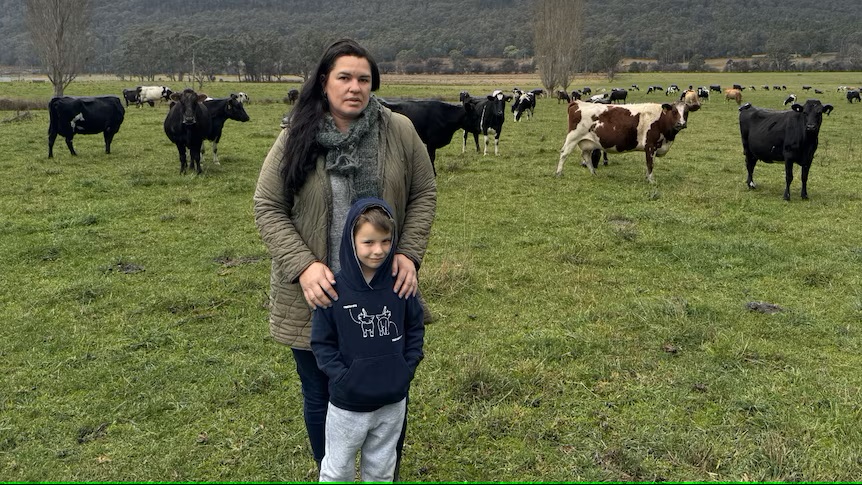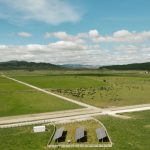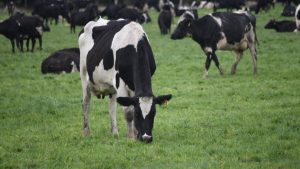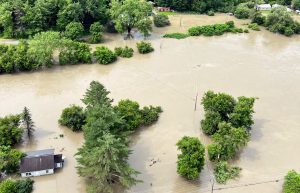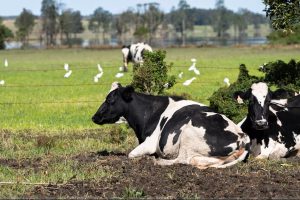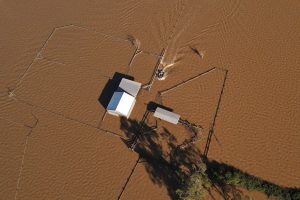
In short:
A hay scam has been doing the rounds in Tasmania, using social media to exploit people who are desperate for feed for their animals.
Farmers are reporting being thousands of dollars out of pocket for hay that never arrived.
What’s next?
People wanting to feed their animals are being urged to be vigilant about who they buy from.
Frantically trying to feed her herd of hungry dairy cows during a record dry period, Tamar Valley farmer Tiffany Eastley turned to Facebook.
“Desperate seeking up to 200 round bales of hay for dairy farm,” she wrote in June.
“Able to organise transport and will take as many or as little available.”
Ms Eastley said she didn’t have a lot of hope, knowing the extremely dry spring, summer and autumn across Tasmania had put hundreds of others in the same tricky situation.
However, she was thrilled when a man who claimed to have several farms in a neighbouring district got in touch.
“We spoke to him several times on the phone,” Ms Eastley said.
“There was just … no red flags. Completely believable.”
Ms Eastley and her husband said they paid the man $3,500 for several truckloads of hay, which they were told would be delivered the next morning.
The day came, but the hay didn’t. The seller stayed in touch, explaining delay after delay.
“It sort of dragged on and … it started to sound too good to be true,” Ms Eastley said.
Ag supply business targeted
In nearby Bridgenorth, agricultural supplier Matthew Cook didn’t think twice when he got a call saying about $3,000 worth of hay had suddenly become available to buy.
He’d also been searching far and wide, hoping to secure extra fodder for his regular customers.
“We’ve had a few customers that are really desperate for hay,” he said.
“We don’t have anywhere near enough to supply them.”
Mr Cook said he’d put the word out, then his wife received a phone call from a man who said some hay had come up for sale as another buyer had fallen through.
“I said to my wife ‘go ahead and organise it’,” Mr Cook said.
The couple forked out $1,500 as a deposit and then waited.
And waited.
Over the next couple of days, the Cooks received multiple messages from the man, explaining delay after delay, including a broken-down truck.
The hay never came.
‘We urge farmers to be vigilant’
Ms Eastley and Mr Cook are not the only farmers who have fallen victim to stockfeed scams in recent weeks.
“These people operate by advertising hay and asking for a deposit and then never deliver, nothing comes of it,” TasFarmers president Ian Sauer said.
A farmer himself, Mr Sauer said he had witnessed an “alarming rise” in financial scams targeting the agricultural community.
“We urge farmers to be vigilant and cautious,” he said.
“Firstly, being asked to pay a deposit should raise a red flag. It’s crucial to confirm the source of the hay and the expected delivery date.
“Secondly, verify the credentials of the seller and seek third-party endorsements. Remember, using resources like Google can be helpful.”
Preying on community trust
Mr Cook said the particular scam his business had been taken in by took advantage of a trust system built over decades among bush communities.
“We’ve been doing this for 15 years and I’ve never been caught in a scam,” he said.
“It’s quite normal to pay a deposit in this industry. Usually, people get hay from the same people every year. So, it’s quite a reliable sort of system … it’s not an issue. This year, because of the scarcity, everyone’s going outside of their normal channels.
“I certainly have to consider doing business paying deposits for people I don’t know who don’t have a reputation in the game, for sure.”
Animals sold due to lack of feed
For Ms Eastley and her family, the scam was a pivotal point.
“We were quite shy, and removed the ad after that scam,” she said.
“We thought perhaps it was a waste of time … so it actually led to us selling some of our livestock, once we realised that we weren’t going to be able to secure fodder to feed them.”
In the weeks since, at least half a dozen commercial and hobby farmers around the state have reached out to Ms Eastley with similar stories.
“A lot of people were too frightened to go to the police,” she said.
“It’s so difficult to warn people; you’ve just got to be really vigilant, even though it’s quite normal to have to put deposits on things before delivery.”
Tasmania Police confirmed it had charged an individual in relation to alleged fraudulent activities involving stockfeed.
You can now read the most important #news on #eDairyNews #Whatsapp channels!!!
🇺🇸 eDairy News INGLÊS: https://whatsapp.com/channel/0029VaKsjzGDTkJyIN6hcP1K
